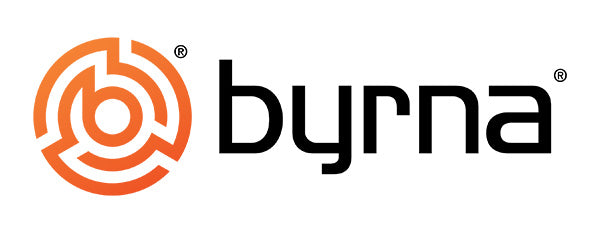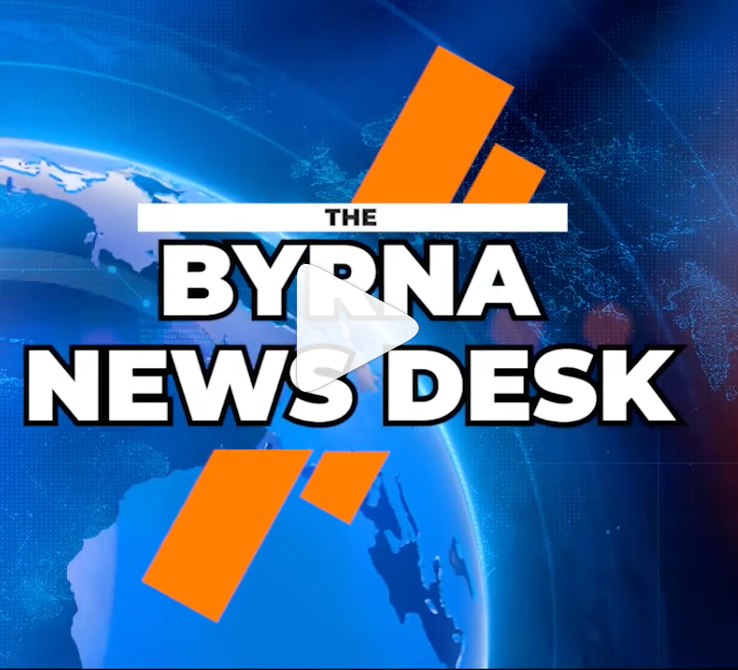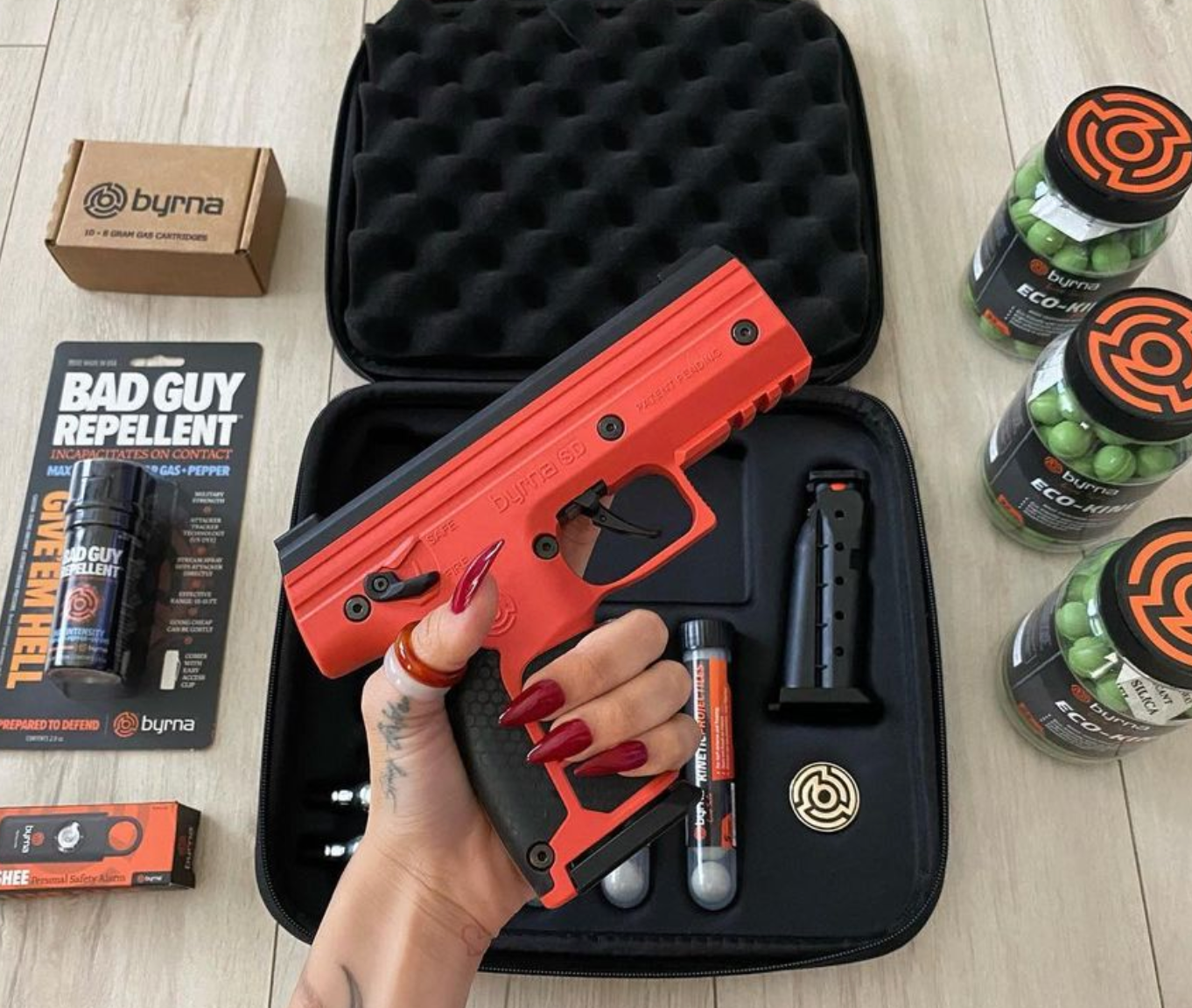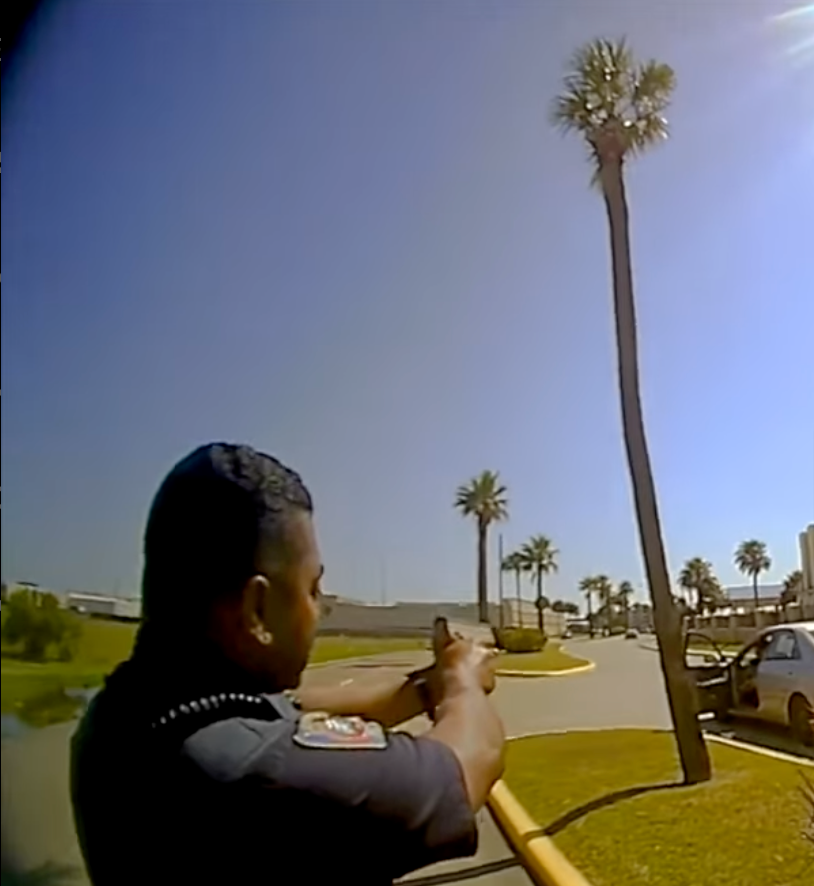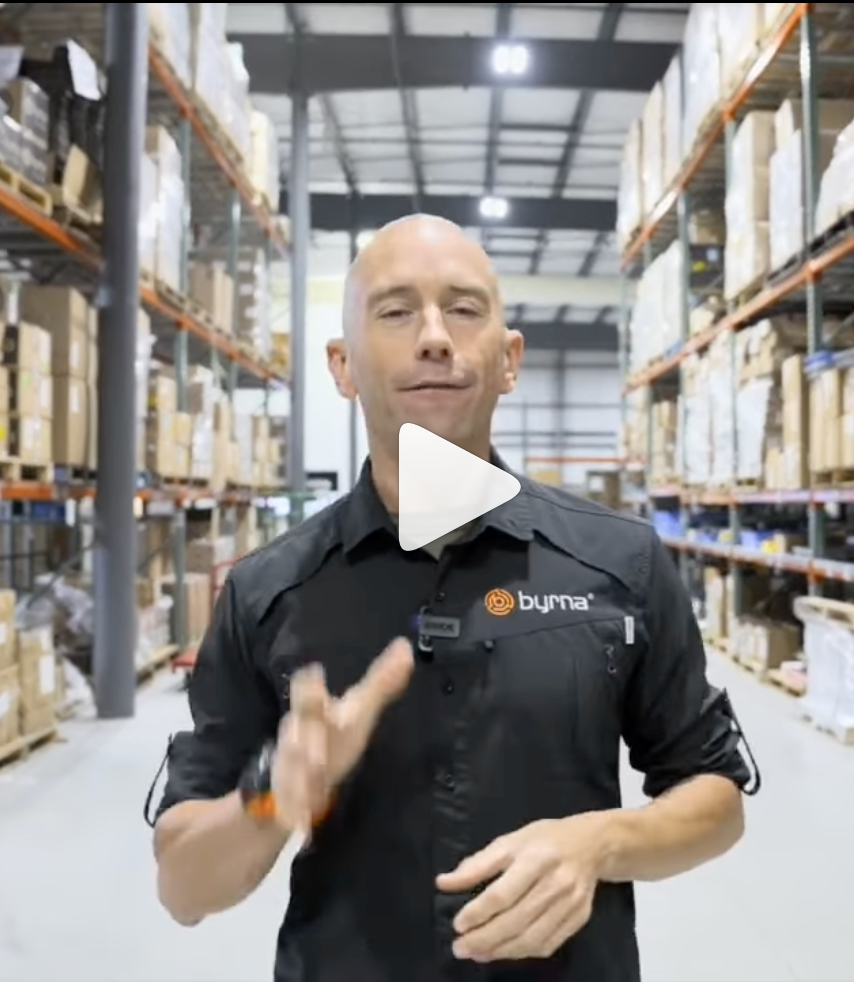
Imagine you get pulled over by the police and there's a weapon in your car. In Canada, traffic stops sometimes happen for reasons like scheduled checks or small violations. When this happens, you need to hand over the needed documents - like your driver's license and registration.
Weapons in your car can really change what happens next and how safe you feel. Do you have to tell the police about a weapon in your car? You want to follow the law and keep everyone safe, including yourself. This isn't always known, and the answer could actually surprise you.
So let's get started!
Disclaimer: We are not attorneys. The law can change, especially between provinces. Our Byrna launchers are for use inside of your home only and cannot be carried or used outside of your home. Please ask your attorney for tailored legal advice.
Table of Contents
Declaring Firearms
When you're in Canada, cops won't ask you to declare firearms at a traffic stop unless they specifically ask you. Owning and moving firearms here means you'll follow a bunch of rules and get the right permits.
You have three types of firearms: non-restricted, restricted, and prohibited. Non-restricted firearms mostly cover regular hunting rifles and shotguns. When you need to transport restricted guns like handguns or pepper spray, you have to have an Authorization to Transport (ATT) permit. Prohibited firearms are off-limits - so don't even try with things like assault rifles and completely automatic guns.
If you ever borrow a firearm in Canada, make sure to get a Temporary Firearms Borrowing License. Also, if you're visiting and want to bring a firearm, you need to fill out a Non-Resident Firearm Declaration form. Plus, you'll also pay $25 for this.

When transporting weapons, you have to follow very strict rules. Always use locked containers and protect the firearm with a locking device for restricted and prohibited guns. If leaving your weapon in an unattended vehicle, follow specific storage needs to stay away from trouble with the law.
Failing to comply brings serious trouble. Having your illegal or undeclared gun seized is just the start. Handling or passing on a prohibited weapon could land you in prison for up to 10 years. You really don't want that to happen! Consider these consequences before making any choices.
Importing firearms means jumping through hoops. You need a valid firearms license to bring in any firearm, parts, or ammo. Banned items are prohibited no matter what. You see, these strict rules are in place to keep everyone safe.
Public safety relies on knowing and following these rules. Canadian border authorities do background checks on people declaring firearms. Also, court orders can stop people from possessing them. Police can search without warrants and seize undocumented guns. These strict measures exist to protect everyone's safety.
During a traffic stop in Canada, remember you only declare a firearm if asked. Always transport your gun unloaded and locked securely. If a cop asks, be honest. You also have the right to stay silent if not directly questioned about your firearm. Knowing this helps you deal with law enforcement and keeps you on the right track.
Declaring Non-Firearm Weapons
You legally don't have to talk about a non-firearm weapon unless asked. But similiar to firearms, if you lie or stay silent when asked, you could get in serious trouble. Let's go deeper into this.
In Canada, the law splits weapons into prohibited and restricted categories. The Canadian Criminal Code lists things like automatic firearms, sawed-off shotguns, and spring-loaded knives as restricted. Without authorization, you can't have these - it's illegal and can get you charged heavily. Think about being stopped and suddenly finding yourself on the wrong side of the law because of something you didn't declare. You wouldn't want that.
Also, concealing a weapon without the right papers is another huge problem. Section 90 of the Criminal Code says hiding a weapon without permission can mean up to five years in jail. You could be having a wonderful day and then suddenly - bam, you have to face jail time.

Carrying a weapon for dangerous reasons is another issue. Under Section 88, if police think you're carrying a weapon to disturb the peace or commit a crime, you could face up to ten years in jail. Think before you stash something in your car's glove box - the consequences are extreme.
You could think carrying a weapon for self-defense is okay. Sometimes it is. But you need to know that the law says the force you use must match the threat. If you use too much force, even in self-defense, the law could see you in more trouble. It's hard to know exactly where that line is.
Even though there's no clear rule to tell cops about your weapon unless asked, not saying anything or lying can still cause big problems. Just to give you an example, unauthorized possession or carrying a concealed weapon can bring harsh legal results. So being honest could just save you from bigger issues.
But cops can search and take your weapon if they think you're up to something bad - and no, they do not need a warrant every time! Public safety is more important - meaning a search can happen without you even knowing it was legal.
You don't have to volunteer info about your weapon in a traffic stop, but your legal safety depends on truthfulness and following the rules when asked.
When Should You Tell Officers?
You are better off staying calm during a traffic stop to keep things safe for you and the officer. Being clear and calm really helps when dealing with law enforcement. Do you need to tell them about a firearm? Calmly say where it is. Never make any hand gestures towards the weapon. This reassures them and cuts back on tension.
Always remember your concealed carry permits because they can make rules about disclosure difficult depending on your location. In Canada, you don't have to inform right away. In some U.S. states, like Alaska, Arkansas, and California, you need to tell officers right away about a concealed handgun.
Now picture you're a passenger during a vehicle stop. In Canada, mentioning a concealed weapon only matters if asked. Once the officer starts talking to you, being honest is smart. You can help stay away from misunderstandings and legal issues.

Sometimes you might find recording your run-ins with police isn't a bad idea either. It is your right and can be helpful evidence later - but always follow local laws about recording conversations.
If your weapon is visible, tell the officer right away. You want to stay away from surprises to keep the interaction smooth. Clear and calm discussions may seem like a strategic game - but - honesty and composure really matter!
Your Rights and Responsibilities When Pulled Over
When the police pull you over in Canada, you need to tell them if there are any weapons in your vehicle. This step matters for several reasons. First, it keeps both you and the officer safe during the stop. Police handle situations with weapons very carefully. Letting them know upfront helps keep things calm and under control.
Usually, the officer will likely ask for your driver's license, vehicle registration, and proof of insurance. You might want to inform the officer of their location before you reach for these documents. This small courtesy really makes a big difference. Picture the officer feeling relieved when they know you aren't going for anything dangerous - this puts both of you at ease.

Let's talk about vehicle searches next. Actually, you can refuse a search if the officer lacks reasonable grounds. Section 8 of the Canadian Charter of Rights and Freedoms protects this right. If you are unsure, you can also call your lawyer on the spot.
Knowing your rights is super helpful, but so is cooperation. Of course, you do not have to answer every single question the officer asks. Sometimes saying less can work in your favor. However, being polite and cooperative can make a big difference. Think of it like driving on a two-way street - your actions help create a less tense situation, which benefits you.
If asked to take a sobriety test, you should comply. Refusal to take the test is an offense. It's better to just go with the flow in this case. If you haven't been drinking, this probably won't be a problem.
Got a ticket? Stay calm. Accepting the ticket in Canada doesn't mean you're admitting guilt. You can still challenge it in court later. It's like holding a door open for someone - a simple act of cooperation can prevent a lot of stress.
Remember, the rules can vary by province and we are not lawyers. Always stay informed about local laws and regulations.
Officer's Perspective and Safety Concerns
You never know what will happen during a traffic stop. Knowing if you have a weapon will change how the officer approaches you.
You should always tell the officer about your weapon. Doing this really helps them manage the situation better. This easy heads-up can cut back on misunderstandings, to reduce the chances of things getting out of hand. Officers are trained to stay calm, but if they know what to expect, they can stay in control more.
When you're upfront with the officers, they feel less stressed during the stop. Studies back this up! With less stress for the officer, things will go smoother. When interactions are relaxed, everyone comes out better. That sounds nice, doesn't it? Quite a few police officers have said they prefer to know early on to stay away from any confusion later.
When you disclose your weapon to the officer, you help keep everyone safe. It's really that easy; these little acts of courtesy can help everyone return home safely.

You could wonder about your rights, and that's perfectly natural. Disclosing a weapon could feel like an invasion of your privacy, but you have to see the bigger picture sometimes; letting the officer know first also protects you. If the officer finds out about your weapon later, it could cause panic. But if you're open right from the start, you build trust faster.
Experts in law enforcement agree that honesty during traffic stops avoids issues. An officer shared in an interview, "Knowing there's a weapon changes our approach and makes it safer for all parties." This isn't just talk - it's helpful advice. This strategy has been tested over time and shows really positive outcomes. So next time you get pulled over, practice some transparency - it will make a noticeable difference.
Tips for Handling Traffic Stops
You have to tell Canadian cops about any weapons during traffic stops. When you're pulled over, let the officer know right away if a weapon is in your vehicle. Doing this really keeps you on the right side of the law and helps keep the situation calm and safe. Everyone's safety depends on clear communication - which actually avoids misunderstandings.
Also, roll down your window and keep your hands on the steering wheel where they can be seen. This sets a tone of cooperation and trust with the officer. Imagine an awkward silence when a favorite song cuts out mid-chorus. So, you want to remove any tension right from the start.
If you have a firearm or another weapon, say, "Officer, I want you to know that I have a [type of weapon] in my car.", don't reach for it. Just tell them calmly and wait for the officer's instructions. To stay away from sudden moves, keep things calm. Clear communication is important.

Then, the officer will let you know what to do next. Think of it like playing a game where you wait for the rules before making your first move. Keeping it easy and safe for both sides is important. Following instructions helps manage the situation well.
Really, you should comply with the officer's instructions without debate. Now isn't the time to argue. Always let the officer lead and only move when told to. This keeps everyone calm and cooperative - improving safety for all involved.
A helpful tip: always keep your weapon's registration and ID documents accessible but away from the weapon. This makes the process smoother for you and the officer. Picture fumbling around without your glasses. Annoying, right? Here, keeping things organized cuts back on stress for everyone.
When you stay calm and take a few deep breaths, this helps keep your composure and reassures the officer. Deep breaths can keep you steady and calm.
Protect Yourself and Your Family
When you are driving and keeping everyone safe, you need to stay alert and follow the rules - this helps you feel at ease. It will make sure of safety by sticking to the law.
You can bring this proactive mindset into other parts of your life. Think about how a bit of preparation makes a difference. Being ready can help you through areas, like self-defense readiness. This strategy can actually help make things easier, reduce stress, and help with efficiency.

If you want to stay prepared, you could have reliable self-defense options to keep you and your family safe. At Byrna Canada, we have excellent less-lethal self-defense tools made just for Canadians. They're legal in every province. Imagine having products like pistols, rifles, CO2 cartridges, and sirens at your disposal. You don't need any background checks to get them. Plus, our self defense rifles and pistols not considered "firearms" by the letter of the law, so you can even keep them in your car.
Order today and have legal self-defense tools delivered right to your door anywhere in Canada - this will make sure that everyone can access safety measures. With free shipping on all launcher orders, there's no better time to check out Byrna Canada.
Check us out at Byrna.ca and look at our full catalog! This could change how you approach personal security and peace of mind.
